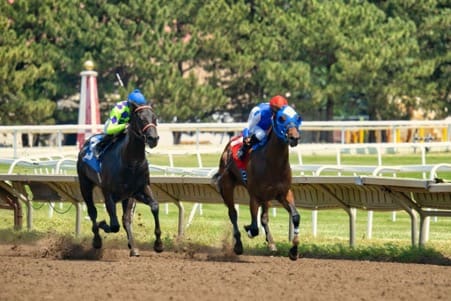Horse racing, an ancient sport that dates back to classical civilizations, holds a unique charm and timeless appeal. In the contemporary racing landscape, the Triple Crown stands as a pinnacle of achievement – a testament to a horse’s resilience, speed, and pedigree. A trio of gruelling races, spaced just weeks apart, challenges 3-year-old thoroughbreds to a demanding test of stamina and skill. Those that claim victory in the Kentucky Derby, Preakness Stakes, and Belmont Stakes are not just winners – they are immortalised as Triple Crown legends.
In the span of a century since Sir Barton etched his name into the annals of history, only 13 thoroughbreds have secured this coveted title. Today, we honour these equine luminaries, tracing their stories of perseverance, triumph, and unyielding spirit.
Sir Barton: The Pioneer (1919)
The stage was set in 1919 when Sir Barton, the trailblazer, became the first horse to clinch all three victories. Prior to this, no other horse had accomplished such a feat in a single year. His success paved the way for subsequent generations of horses to dream and aspire.
Secretariat: The Incomparable (1973)
Fast forward to 1973, and the world witnessed a horse racing prodigy like no other – Secretariat. Not only did this remarkable thoroughbred clinch the Triple Crown, but he also set a blazing record in the Kentucky Derby that remains unbeaten to this day. Secretariat’s combined time across the three races remains the fastest, showcasing a level of dominance that has rarely been matched. His Belmont Stakes victory, where he won by an astounding 31 lengths, is considered one of the greatest moments in sports history.
American Pharoah: Breaking the Drought (2015)
A quarter of a century can feel like an eternity in the world of sports, and that’s precisely how long the horse racing community waited for another Triple Crown winner after Affirmed in 1978. The anticipation was palpable. Then, in 2015, American Pharoah galloped onto the scene, ending the 25-year Triple Crown dry spell. His wins reinvigorated the sport, reminding enthusiasts of the magic and allure of these races.
Justify: The 13th Marvel (2018)
Close on the heels of American Pharoah, Justify, in 2018, proved that lightning could indeed strike twice. This magnificent horse surged through the tracks, earning the 13th spot on the esteemed list of Triple Crown winners. His sweep reaffirmed that the spirit of competition was very much alive, with new legends waiting to emerge.
The Triple Crown races are open to a diverse cohort of thoroughbreds, including both colts and fillies. While fillies have historically proven their mettle by winning individual races within the Triple Crown series, the overarching title of Triple Crown winner has yet to be won by a filly. Similarly, geldings, despite their impressive achievements in the individual races, have yet to clinch the esteemed Triple Crown. A notable mention in this context is Funny Cide, a gelding that came tantalisingly close to this honour in 2003 by securing victories in both the Derby and the Preakness.
Why is the Triple Crown so elusive?
The mere fact that only 13 horses have managed to win the Triple Crown in a century underscores the size of the challenge it presents and the best horse racing betting sites will only offer long odds all year round. It’s not just about speed. It’s about endurance, strategy, adaptability, and a sprinkle of luck. Each of the three races has its unique challenges. The Kentucky Derby, often called “The Most Exciting Two Minutes in Sports,” is a fast-paced sprint. The Preakness Stakes, although shorter, comes swiftly on its heels, testing a horse’s recovery and resilience. And then there’s the Belmont Stakes, the longest of the three, demanding stamina and lasting power.
Foremost, there’s a prevailing sentiment in the equestrian community that contemporary thoroughbreds lack the robust durability of their past relatives. This theory is substantiated by the shift in breeding patterns over the decades. Horses of today are predominantly bred for speed, often at the expense of stamina, resulting in racehorses that may lack the endurance needed to clinch three demanding races in quick succession.
Additionally, the racing frequency of modern thoroughbreds is notably sparse compared to their predecessors. For instance, when Secretariat clinched the Kentucky Derby in 1973, he was already seasoned with 13 career starts, whereas Citation, the 1949 Triple Crown victor, boasted an even more extensive experience with 16 prior starts.
In an era gone by, horses like Sir Barton and Count Fleet juggled multiple races within the span of the Triple Crown series — a feat almost unimaginable in today’s racing landscape. The contemporary racehorses, given their predisposition for speed, are seldom tested in races exceeding one-and-one-eighth miles, yet the Triple Crown’s demands far exceed this, both in length and in the condensed time frame. Such an intensive racing schedule is at odds with the modern practice of allowing top horses to race once every five to six weeks, exemplified by last year’s Horse of the Year, Wise Dan, who graced the racetrack merely six times throughout the year.
Furthermore, the narrow window between these races leaves little room for recovery, necessitating peak physical and mental conditioning. For a horse to conquer all three events is akin to a marathon runner winning sprints and hurdles with just days of rest in between.
In the words of legendary jockey Eddie Arcaro, a two-time Triple Crown winner, “You can’t explain it. You just know you’ve done something that nobody else could do.” It’s this elusive allure of the Triple Crown that keeps us riveted, year after year, in the hope of witnessing another legend in the making.
In the end, while the races might be fleeting moments on the tracks, their legacies linger, echoing the timeless appeal of horse racing and the relentless pursuit of excellence. The Triple Crown winners are not just about sporting achievements; they are tales of passion, grit, and an indomitable spirit that resonates across ages.

